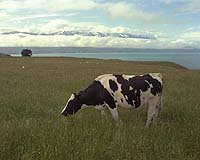 |
Davis CA (SPX) Feb 17, 2010 The looming threats of global climate change and population growth call for sweeping changes in how the world produces its food and fiber, warns a group of prestigious scientists, including an expert in plant genetics at the University of California, Davis. The research team, led by Nina Federoff, science and technology adviser to Secretary of State Hillary Clinton, suggests that there is a "critical need to get beyond popular biases against the use of agricultural biotechnology," as well as explore the potential of aquaculture and maximize agricultural production in dry and saline areas. Their recommendations will appear as a perspective piece titled "Radically Rethinking Agriculture for the 21st Century" in the Feb. 12 issue of the journal Science. The researchers note that the impacts of climate change on agriculture and human health are already apparent. They point to the 2003 heat wave in Europe, which caused just a 3.5-degree rise in the average summer temperature, but killed 30,000 to 50,000 people. Gaining much less attention was the resulting 20 percent to 36 percent decrease in the yields of grains and fruit that summer. "That dramatic drop in yield is just a foreshadowing of the challenges that lie ahead for agriculture during the 21st century, as temperatures rise and another 3 billion people are added to the global population," said UC Davis plant pathologist Pamela Ronald, a co-author on the perspective piece. Ronald and her laboratory are working on developing a new generation of crops that can better resist diseases and tolerate environmental stresses, including flooding. "Global warming will alter the pattern of diseases among crops and also cause intense, periodic flooding," Ronald said. "The good news is that we have the ability, through conventional breeding and genetic engineering, to generate new varieties of our existing food crops that can better adapt to these environmental changes. She noted, for example, that her research collaborators recently released a new rice variety for Bangladesh and India that can better withstand flooding, an environmental stress that reduces yearly yields by 4 million tons - enough to feed 30 million people in these two countries. The researchers also suggest that future food, feed and fiber crops would ideally be capable of making better use of nitrogen from the environment, to minimize water pollution and greenhouse gas emissions associated with chemical fertilizers. Additionally, they recommend that efforts aimed at increasing agricultural productivity and eliminating global hunger should be focused on:
+ Re-evaluating restrictive regulatory policies that now govern the use of genetically modified crops;
+ Establishing a public facility within the U.S. Department of Agriculture for safety-testing genetically modified crops;
+ Integrating agriculture and aquaculture systems in order to sustainably raise crops, livestock and fish; and
+ Developing crops and productive farming systems for extremely dry and saline regions. This perspective piece was developed from the authors' presentations during a September 2009 workshop titled "Adapting Agriculture to Climate Change: What Will it Take?" which was held under the auspices of the Office of the Science and Technology Adviser to the U.S. Secretary of State.
Share This Article With Planet Earth
Related Links University of California - Davis Farming Today - Suppliers and Technology
 Untethered cows may produce less milk
Untethered cows may produce less milkOslo, Norway (UPI) Feb 16, 2009 Norwegian scientists say they've determined so-called "free-stall" untethered cows in small herds produce less milk than cows tied to their stalls. The scientists who compared performance and health within the two stall types found tethered cattle have a higher reproductive performance and suffer less teat injuries and metabolic diseases. The research was in response to a governm ... read more |
|
| The content herein, unless otherwise known to be public domain, are Copyright 1995-2010 - SpaceDaily. AFP and UPI Wire Stories are copyright Agence France-Presse and United Press International. ESA Portal Reports are copyright European Space Agency. All NASA sourced material is public domain. Additional copyrights may apply in whole or part to other bona fide parties. Advertising does not imply endorsement,agreement or approval of any opinions, statements or information provided by SpaceDaily on any Web page published or hosted by SpaceDaily. Privacy Statement |